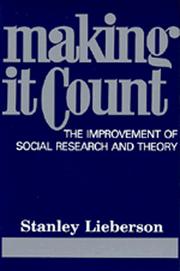| Listing 1 - 1 of 1 |
Sort by
|

ISBN: 1282355317 9786612355318 0520908422 9780520908420 0520053508 0520060377 9780520060371 9781282355316 661235531X Year: 1987 Publisher: Berkeley, Calif. University of California Press
Abstract | Keywords | Export | Availability | Bookmark
 Loading...
Loading...Choose an application
- Reference Manager
- EndNote
- RefWorks (Direct export to RefWorks)
This title reexamines and reconsiders the model of empirical research underlying most empirical work. The goal is neither a whitewash nor capital punishment, but rather it is to reform and mold empirical research into an activity that contributes as much as possible to a rigorous understanding of society. Without worrying about defining science or even determining the essence of the scientific enterprise, the goal is one that pools together logical thinking and empirically determined information. One of the fundamental issues to be addressed in this volume: Are there questions currently studied that are basically unanswerable even if the investigator had ideal nonexperimental data? If so, what are the alternative questions that can be dealt with successfully by empirical social research, and how should they be approached? In the chapters ahead, it will be important to keep in mind this doctrine of the undoable. Of course, one cannot simply mutter ";undoable"; when a difficult obstacle is encountered, turn off the computer, and look in the want ads for a new job-or at least a new task. Instead, it means considering if there is some inherent logical reason or sociological force that makes certain empirical questions unanswerable. There are four types of undoable questions to consider: those that are inherently impossible; those that are premature; those that are overly complicated; and those that empirical and theoretical knowledge have nullified.
Sociology --- Social sciences --- Research --- Methodology. --- 303 --- #SBIB:303H10 --- 303 Methoden bij sociaalwetenschappelijk onderzoek --- Methoden bij sociaalwetenschappelijk onderzoek --- Methoden en technieken: algemene handboeken en reeksen --- Methods in social research (general) --- boyles law. --- causality. --- causation. --- conducting research. --- data collection. --- empiricism. --- evaluating data. --- logic. --- nonexperimental data. --- nonfiction. --- political science. --- quasi experiment. --- research assumptions. --- research methods. --- research questions. --- research. --- sampling problems. --- science. --- scientific enterprise. --- scientific method. --- scientific theory. --- selectivity. --- social research. --- social science. --- sociological methodology. --- sociology. --- variables.
| Listing 1 - 1 of 1 |
Sort by
|

 Search
Search Feedback
Feedback About UniCat
About UniCat  Help
Help News
News